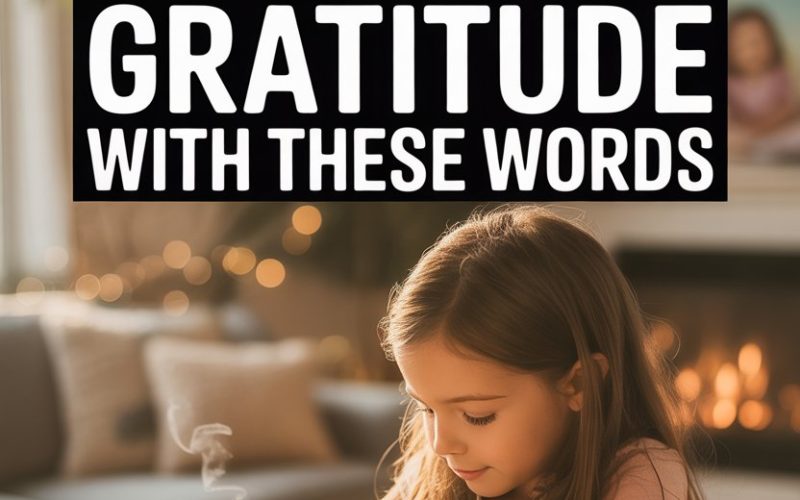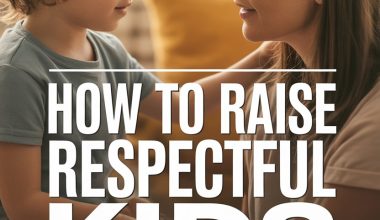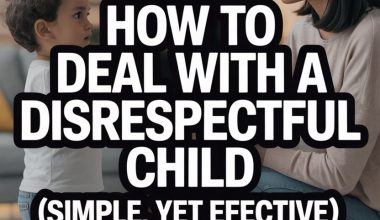Feeling grateful doesn’t always come naturally to little humans—especially after a 12-hour Lego marathon followed by a dinner of “not pasta again!”
Yet gratitude is a skill that can be built, like stacking blocks (just with less foot pain for parents).
The good news? Teaching kids the language of thankfulness doesn’t require Zen-master patience or a Pinterest-perfect life.
It just takes a few thoughtful words. And maybe a biscuit or two for fortitude.
Why Words Matter in Raising Grateful Kids
Small children are emotional sponges.
They soak up every “thank you” you utter at the drive-thru window, every “please” you drop at the dinner table, and yes, even every “ARE YOU KIDDING ME?!” whispered under your breath when you step on a rogue toy car at 6:15 a.m.
Language shapes their worldview. According to Harvard’s Making Caring Common Project, children who regularly talk about gratitude with adults are more likely to feel and express it themselves.
The trick isn’t forcing kids to say “thank you” like robots. It’s about weaving the language of appreciation into daily life, so it feels as natural as reaching for the remote on a rainy afternoon.
Starting With Thank You—but Not Stopping There
“Thank you” is the obvious MVP of the gratitude vocabulary.
Yet, after a while, it starts to sound like background noise—kind of like the Peppa Pig theme song on endless repeat. To keep it meaningful, go beyond the basics.
Try adding specifics:
- “Thank you for helping me clean up the crayons. You’re a great helper.”
- “I’m really glad you shared your snack with your sister. That was so thoughtful.”
Describing what your child did, and why you appreciated it, reinforces that their actions matter. It’s not just about politeness; it’s about connection.
According to Dr. Robert Emmons, a leading gratitude researcher at UC Davis, specificity deepens the positive effects of expressing thanks.
Name the Feeling—Out Loud
Children aren’t mind readers (yet). Labeling the feeling of gratitude when it pops up helps kids connect their actions and emotions.
Try phrases like:
- “That made me feel so happy.”
- “I feel really lucky you’re my kid.”
- “I’m grateful we have this time together.”
When little ones hear you name your emotions, they learn to do the same. It’s Emotional Literacy 101, and it works wonders for empathy as well.
Try This: The Compliment Sandwich
A little structure can make expressing gratitude less awkward, especially for shy or reluctant kids. Enter the compliment sandwich—not to be confused with the half-eaten one you found in the car seat.
Here’s the recipe:
- Start with a positive (“I love how you set the table tonight.”)
- Add a specific thank you (“Thank you for remembering everyone’s napkin.”)
- Finish with a feeling (“It made dinner feel really special.”)
Suddenly, gratitude isn’t one awkward word—it’s a full conversation.
Teach Magic Words for Generosity
“Please” and “thank you” are classics, but let’s expand the gratitude vocab. Encourage older children to sprinkle in phrases that show appreciation for kindness:
- “That means a lot to me.”
- “I appreciate your help.”
- “You didn’t have to, but I’m so glad you did.”
These phrases remind children that kindness isn’t owed—it’s a gift.
Spot the Silver Linings (Even When It’s Raining)
Gratitude isn’t only for birthdays and surprise ice creams. Some of the best lessons come from everyday mess and minor disasters.
Missed the bus? “At least we got some extra time to chat on the way to school.”
Spilled juice all over the floor? “Well, now the kitchen smells like oranges!”
This is straight out of the Positive Psychology playbook. Researchers have found that regularly spotting the good (even tiny bits of it) trains the brain to lean optimistic.
Soon, kids will be finding silver linings before you do. And possibly even appreciating vegetables. Possibly.
Give “Gratitude Scripts” for Tricky Situations
Sometimes, kids freeze up in social settings. What should they say when Auntie gifts them socks? How do they handle a friend sharing a half-melted chocolate bar?
Offering ready-to-use “scripts” helps take the pressure off. Try practicing together:
- “Thank you for thinking of me!”
- “Wow, that’s so thoughtful.”
- “I’ve never seen socks with llamas before—so cool!”
Role play is your friend here. Make it silly. Make it fun. Kids remember more when there’s giggling involved.
Notice the Helpers—And Name Them
Channel your inner Fred Rogers. Point out the people who make your family’s life run smoother: the bus driver, the lollipop lady, the person stacking shelves at the grocer’s, the nurse at the surgery.
Encourage your child to say things like:
- “Thank you for helping everyone get to school safely.”
- “I’m glad you’re here to help us.”
Not only does this teach gratitude beyond the family bubble, it shows children their words can brighten someone’s day—often more than a handful of glitter (with less sweeping required).
Turn Grateful Words Into a Family Ritual
Dinner tables are made for more than peas and negotiations over the last Yorkshire pudding. Start a simple ritual: everyone shares one thing they’re grateful for, big or small.
If “family dinner” sounds like a mythical event at your place, try bedtime, bathtime, or even the school run.
No need for grand declarations. “I’m glad the cat didn’t puke on my shoes” counts. So does “Thanks for letting me play Minecraft for five minutes longer.”
Consistency trumps perfection.
A study out of the University of California found that families who make gratitude a regular topic end up with children who are more optimistic, generous, and resilient.
Write Gratitude Notes—Or Drawings, or Messages on Bananas
Sometimes, words come easier on paper (or peels). Keep some sticky notes handy and encourage your child to leave surprise thank-yous for family members, friends, or teachers.
Not a fan of writing? Get creative:
- Draw a thank-you picture.
- Record a silly voice message.
- Write “Thanks for packing my lunch!” on a banana with a ballpoint pen.
This shifts gratitude from a moment to a memory, something your child (and their lucky recipient) can revisit.
Model, Model, Model—Even on Your Worst Days
Kids are expert mimic-machines. When they hear parents genuinely thank the delivery driver, apologise for a mistake, or acknowledge the help of a partner, it registers.
Even on days when you feel less like a gratitude guru and more like a caffeine-fuelled crisis manager, your words matter.
It’s not about perfection.
If you catch yourself muttering under your breath about emptying the bins for the millionth time, double back: “I know I grumbled, but really, I’m lucky to have a home to clean up. And a family to make messes with.”
It’s honest. It’s real. Kids appreciate authenticity.
What About When Kids Just Don’t Want to Say Thanks?
There will be days when your child would rather lick the pavement than utter a thank you.
Sometimes it’s shyness. Sometimes it’s stubbornness. Sometimes, there are simply no words for the horror of Auntie’s infamous beetroot brownies.
Resist the urge to force gratitude. Instead, model and prompt gently:
- “Would you like to say something, or should I?”
- “I can see you’re not sure what to say—maybe we’ll write a thank-you note together later?”
Over time, the pressure fades and kids come around to “thank you” on their own terms. Coercion rarely breeds genuine gratitude, but patience does magic.
The Hidden Benefit: Resilience in Little People
Researchers at the University of North Carolina found that even small acts of noticing and naming gratitude can boost children’s emotional resilience.
When kids practice thankful words, they build a buffer against entitlement and disappointment. Life won’t always go their way—but having a grateful heart makes the rough patches softer.
And before you know it, your little one will be the one reminding you: “Mum, aren’t you glad there’s only ONE lost shoe this morning?”
Gratitude: Not Just for Kids
Here’s the secret nobody tells you: practicing gratitude words as a family changes everyone.
Even after a day when the only thing you’re grateful for is the existence of CBeebies and coffee, saying it out loud makes it feel more real.
Every thank you, every “I’m glad you’re here,” every banana-note of appreciation—each one plants a seed.
Some days, those seeds sprout into dazzling displays. Other days, they’re buried beneath a to-do list the size of a shopping trolley.
Keep using the words. Your kids are listening. And sometimes, they’ll surprise you right back.
Making Gratitude Stick—One Word at a Time
No one expects children to become pint-sized sages overnight. Raising grateful kids is an everyday practice, not a one-off achievement.
With a handful of the right words and a pinch of patience, you’re giving them tools for a lifetime of optimism, connection, and resilience.
And maybe, just maybe, a few fewer arguments about who got the bigger slice of cake.
That’s something worth being thankful for.




